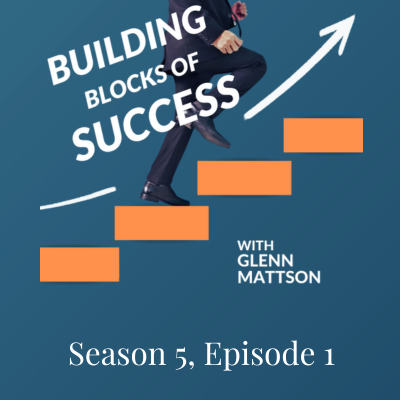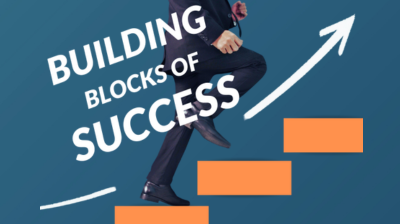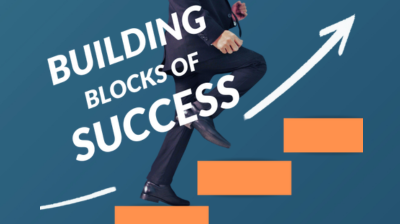
The content of this recording is copyrighted by Sandler Systems LLC. All rights reserved.
Hey, welcome back, everybody to the building blocks of success. I'm your host, an entrepreneur and starting out in creating your own business. We take a look at time, energy, and effort. It's one of the things that I want to spend some time on today, along with endurance and patience. Have you ever heard the phrase that it's a marathon, not a sprint? That's exactly what we're going to be talking about today. I can't tell you how many conversations I have with people on a weekly basis that they're frustrated because they're not being, or they haven't reached the level of success that they expect. They see things on Instagram, the things on social media where you can be, you know, successful in three days, make a million dollars in 12 months, etc., and they're grinding the grind, trying to figure out how to make it work and feel like they're doing something wrong.
So, I want to share with you, because I've helped well over 15,000 entrepreneurs start, develop, grow, and then really succeed to the point where if they wanted to sell the business or have succession to a second generation or even third. So, for those starting off on your entrepreneurial journey today, let's have a conversation for you and those individuals who just met with a friend literally 15 minutes ago, exceedingly highly successful business, just getting tired. So, this next series, what we’re going to be doing in Season Five is really all about entrepreneurship.
In this session right now, I want to talk about the beginning stages of what that looks like. I really want to talk about the time, energy, effort, endurance, and patience it takes to be successful. It's not overnight. For those of you who are beginning your journey, your entrepreneurial journey, honestly, it's really easy to get discouraged when things don't take off immediately. You're putting in huge, long hours. You're giving everything you have to the business. Some of you, quite honestly, are spending a fair amount of your own personal income to have it start. Often feel like you're running in circles. But you know the truth is, is real success? Lasting success takes time, it takes grit, it takes perseverance. It takes resiliency. It takes fortitude, tenacity, self-discipline, and guts. It's not all about talent. There are many talented people out there who aren't successful, so let's take a look at what it really means to be successful in this business, which is entrepreneurship.
Let's take a look at some statistics. So today I want to talk about if you look at the different types of entrepreneurs. We have startups that are scalable startups. We have large corporations, which are our entrepreneurial ships, we have social entrepreneurs and small business owners. So, I'm going to spend a fair amount of my time on the small business owners. I’m going to want to share with you the massive impact that they have United States. Do you realize there are 33 million small businesses in the United States? 99.9% of all the businesses in the United States are small businesses. Do you realize that, if you walk outside right now, just under half of the people you see walking around are all employed by a small business? 47% of everyone walking around in the United States, works for small businesses globally. By the way, it's 50% globally, 90% of all the businesses that are out there are small businesses. Small businesses are really important and have a place in our world.
When you take a look at why individuals want to be their own boss, there are some of those common responses that you get. They could be circumstances. Honestly, people are let go. They are very good at what they do, and they finally say to themselves, that's it. I'm done. I'm going to open up my own shop. I want more control. Maybe it's those individuals who want to start a small business because they want to create something. They want to create something from the ground up. They don't necessarily want to be part of something already built. They want to do it on their own. That actually leads to the third reason, and these are no priority.
The third reason people want to own their own business is they want to be their own boss. So, a lot of times it's Be your own boss, create something from the ground up, kind of circumstances. In addition to that, it's about making more money. So, for many, the money is there also, right? That's a driving force for small businesses. It's interesting. If you look at gender statistics, will tell you that 73% of males want to start a small business to create wealth. 71% of all females who want to start a new business are looking to make a difference. What I found most interesting is we have to acknowledge the truth here. The beginning of your journey.
The beginning of starting a new business, the beginning of an entrepreneurial journey, is hard as heck. There's no sugarcoating it. Do you realize that 20% of everyone fails in the first year, 25% of those who made it right, and 20% are gone? You had 80% left. 25% of that 80% were gone in year two. So, you literally have half of the individuals left after two years. Now, whatever you have left cut that in half by five years. So, 20% fail in the first year, 25% fail in the second year, and whatever's left, over half of those are gone after five years. It's a small group of people that are left. Those individuals, based on statistics, say, if you make it to year 11, you're good. You made it. You made it over the home plate. So those are some pretty daunting figures. Think about that. You say to yourself, I want to start a business, but 20% fail in the first year, whoever's left over, 25% of those fail in the next year, whoever's left over, within five years, half of them are gone.
So, understanding that it takes a lot more than just a good idea to be successful, and in a matter of fact, many of them will fail, and they fail historically for a couple of reasons. One, they couldn't find a demand for what they had. The second, honestly, they ran out of money. These are the individuals that were forced into a situation. Maybe they're corporate America. They say I'm going to give it a shot. Their spouse says, go give it a shot. Do what you can do. They take X amount of dollars out of their personal savings, and they go as fast and as long as they can until their money runs out. But I'm going to tell you the number one reason that small businesses don't make it.
Number one, they couldn't sell their product. Couldn't sell it. So, when you look at the fact that so many people fail, there's just a lot of excitement when you get started, there's a lot of stuff to do, a lot of ideas, optimism. But after you hit that honeymoon period, you're going through all the legal pieces. You start to create your websites, start to put your promotional materials together, do all the legal stuff, do all the social media stuff, and all the technology has been done. Then I will start working on getting in front of people. For an awful lot of people, they spend too much time getting everything else prepared. They don't spend enough time getting themselves out there and getting known and getting business. There are a lot of obstacles, a lot of obstacles you're never going to be prepared for. For a lot of people, finding clients is an issue. For others, it's cash flow. Maybe you have clients, but it's just rejection on another level.
You know, Colonel Sanders, for goodness’ sake, he was not successful until his mid-60s. He actually traveled in his car because he had nothing else. He had literally hundreds of people saying, no, we don't want your special sauce. We don't want your special ingredients, right? But he finally found a chain that would take it and run with it. Hence, became successful. But you don't see Colonel Sanders in any young pictures. Heck, you have, you know other individuals that just had serious adversity, and they can make it back.
Whatever your challenge is, your initial reaction sometimes is to pull back. Maybe it's not the right move. Maybe you're saying to yourself, “I don’t have enough information”. Et cetera. The reality is man, if you put in a half-hearted effort and expect full-time results, starting a business is not something you can do with one foot in and one foot out. It takes your entire heart. It takes your entire mind. It takes all the time that you have to think about what you need to know and what you have the blind spots on. So, let's take a look at this linear journey, which, by the way, is not necessarily accurate.
The road to entrepreneurship is honestly never straight. There's always highs and lows, ups and downs. As a matter of fact, more times than not it feels like a roller coaster. You can see seasoned business owners really don't get emotional about much. In the beginning, you get super emotional about the good stuff, but then you get super emotional when the bad stuff happens. So, it's definitely a roller coaster. There are twists and turns, setbacks, and even times when you feel like everything's going backward, it's okay because it's not a straight line. There are many people who sit there at the end of the night, at the end of the bed, and ask themselves, what am I doing?
So, you have Sarah Blakely, for instance, the founder of Spanx, right? When she first got started, she got rejected by manufacturers, and retail investors, over and over and over again. For two years, she heard no, no, no, but for every reason, she kept pushing. She pushed forward. Next, you know, she got a billion-dollar brand. About Bethany Hamilton, my god, she was a surfer when she was 13 years old. She got bit by a shark, a tiger shark, a tiger shark doesn't want to bite you. A tiger shark bites you and keeps going at it. She lost her left arm. 60% of her blood came out. Man, after one month, she's back on the board. Within a few years, she won the women's surfing competition, several of them, and she's actually in the Hall of Fame 2017. You can go on and on about individuals who failed dramatically. Stephen Hawkins, Oprah, Rocky, you can go on and on.
So, we have to take a look at the fact that setbacks and roadblocks are normal. So, every emerging entrepreneur needs to understand that setbacks are part of your process. They're not designed for something going wrong. They're simply a test of your commitment. In determination, you say that again, roadblocks, setbacks, all they are is a test of your commitment. So, embrace the challenges. Instead of letting them deter you, don't say to yourself, uh oh, now what? Or here we go again. Lean into it. That's got to be your new term. Lean into it, right? No one likes problems and challenges, but you can't run away from them. Now, with that, highs and lows, I also want to share this with you, and this is just a mental game that happens with entrepreneurship. It's patience.
The biggest mistake I see in entrepreneurs is they underestimate how long it takes to really achieve success. We live in an era of instant gratification, where people want immediate results, but the truth is, that businesses don't grow overnight. It takes time to build credibility, takes time to generate consistent revenue, and a time to create a sustainable foundation. I told you before, the average startup for a small business is three to five years just to get your sea legs underneath and get it running. It takes time. Some of them, it takes up to five years to be profitable. Do you realize that's three to five years? Easily, three to five years of grinding, learning constant. Improving. There are no shortcuts to any of this. Patience isn't a virtue in the business. It's absolutely required. Now, patience doesn't mean that you're not pushing, but patience means that you can't expect to climb Mount Everest in one day. You have to be willing to play the game for a long time and understand that the fruits of your labor are not going to come as quickly as you're hoping for.
Man, I have to tell you, I think some of the favorite terms that I have when I talk about entrepreneurs are resiliency, determination, fortitude, tenacity, and self-discipline, right? Self-discipline is the ability to push forward, stay motivated, and take action. Tenacity, being mentally and morally strong, resisting opposition and hardships. Your fortitude is the strength of your mind to encounter pain in adversity with courage, that's fortitude. What about grit? Right? Grit is the determination of passion and perseverance toward a goal despite obstacles and distractions. Right roadblocks. Resiliency is about getting knocked down and getting back up, getting knocked down, getting back up.
Heck, I don't know if any of you, but I had a coach in high school, and, you know, Eddie Ed Lowndes was his name, and I remember the very first time I got lit up and played football, the first time I ever played football. I didn’t even know anything about it quite honestly. Went to the tryouts. Then they had this little exercise where you would put two dummies on the ground or three of them. They would call, you know, two-hole hole, four-hole, and a running back would run through it, and your job was to stop them in between the cones, right in between the dummies. It's basically setting up a runway. We have two people running as fast as they can at each other to see what happens. But man, I got lit up in my very first practice. First time I got hit. I was on my back, looking up. I don't know what was going on. I couldn't hear anything, and all I see is this individual standing over me screaming at me to get up. When my ears finally came back into reality, all I heard was, get up. Get up, get up. What he was saying to me was, get up. Being knocked down is not embarrassing. Being knocked down means nothing. Staying down is the problem. Get up, get up. I can't tell you how many times I've been knocked down in business, and I can hear Ed Lowndes in the back of my head. Get up. Get up. Got to get up and keep moving forward.
You know Angela. Her name is Angela Duckworth. She's a psychologist who studied success, really, across very, very many different industries. She's got great, great stuff. We should look her up. She found grit, which is really in her mind, is the passion and perseverance for long-term term goals. Long Term Goals are a better predictor of success than talent and IQ, it's the ability to keep pushing forward day after day, even when progress is not happening or is nonexistent. I was explaining to someone the other day, he said, what is it like owning your business? Well, in the beginning, you have a vision of what you want, and you put in a full day's hard work, mentally, hard, physically, to everything you're supposed to do. The needle doesn't move an inch. Then you come back the next day and you do it again and it doesn't move an inch. You do it again, the blind faith that your hard work and the time and energy you're putting into it will create results. They're not immediate.
It's the same thing as if you go to the gym and you're overweight or you're thin and you're looking to build up muscle, go to the gym and you work out, you're not going to, all of a sudden look like you're Arnold Schwarzenegger or a big bodybuilder in a week. As a matter of fact, you're not going to see anything. It's going to hurt, yet why do we keep coming back? How come, I still can't understand this - How come, when we go to the gym, we will lift until we are exact, completely exhausted? You're at failure. Don't you lift until failure? That's when your muscles are completely ripped, and then you recuperate by taking time and resting, eating right, and sleeping. That actually will fill in the gap. Of all, what you ripped and that's how you build your muscles. How come when we go to the gym, some of us will lift until we can't move? You lift to failure. Yet, you go to work, and the second you have adversity, the second that weighs a little hard, the second that it becomes tough, you wimp out. How come we do not work until failure? How come we don't put the same amount of mental emotions behind it as we do in other areas?
You’ve got to remember that entrepreneurs with grit understand that setbacks are temporary. It's kind of part of the journey. They don't give up on the first sign of trouble. They don't let frustration and impatience dictate their actions. They trust that their grit is going to work. I remember talking to a managing partner, and what a managing partner is, is someone who was a salesperson moved up, and all of a sudden, I was running an office, running an office of anywhere from, you know, 100 to 800 people. This one individual was out in the Midwest, and his name is Tim. He was retiring from being a managing partner, and I remember helping him succeed with the person that was going to be taking over for him. The name is BJ, and I remember Tim explaining something that I thought was just a fantastic visual.
If any of you have water skied before, and you've water skied and I've been there, that's why I knew the story was good. We had a boat when I was a kid. It was not powerful. It didn't pick you right up. It didn't plane, which means that when the boat pulls you, it pulls you right up, and you're standing up. For many boats, you actually sit in the water. If you ever water skied, imagine yourself in the water. You're in the water, skis are up out of the water like you're sitting in a chair, and the rope that you hold goes between the skis. So, when the boat starts to take off, the rope gets taunt, and in essence, you're supposed to sit up, just like you're sitting laying down, and you're supposed to pull yourself straight up and you sit on your skis and off you go. See, the issue is, is that for a lot of boats, it pulls you five feet, 10 feet, 15 feet. That means it pulls you as long as your bedroom. Sometimes it could pull you as long as your house. When it's pulling you and you're not standing up, you know what happens? All that water hits the skis, and then after it hits the skis, it goes up over the skis and smashes you right in the face. Man, you got to hold on and hold on as long as you can, to suck that water, to learn how to stand up. I cannot stress enough the importance of understanding how to suck water.
Sucking water is about the start of your business when everything that you're doing is what you should be doing, but you're not standing on your feet yet. You have got to be prepared to suck the water for all of you who are looking to start your own business, to be in business for yourself, I just think it's the best thing in the world. Entrepreneurs are action-oriented. They're adaptable to change. They're realistic about what they can control. They have collective goals and personal goals that drive them beyond what most would do, but they also recognize their limits of control. They view challenges as opportunities.
Yet, individuals that have low resiliency, and low grit, right? They're disconnected. They feel like they're a victim. They're depressed. It's never their fault. They keep saying things like, there's nothing I can do. I tried everything. They're disconnected. It's difficult for them to continue. If you look at all of you, when you were younger, we all had natural resiliency. Natural resilience is something that you're born with. That's why you can walk. Adapted resiliency occurs when a challenging circumstance forces you to change what you're doing and adapt. That's entrepreneurship, a lot of adaptive resiliencies. Restored resiliency, because it's three different types, is something you've learned in the past, and you have to bring it back to the front, right, so it's restoring that natural resiliency that you had earlier on you didn't use it. So, you're taking this journey. You're new to being an entrepreneur, I welcome you. I welcome you with open arms. Just realize that the time, energy, and effort it takes to build a business that's long-lasting takes time. So, remember time, energy and effort are what's going to get you there. I'll talk to you soon in the next segment of Building Blocks of Success.
This is the Building Blocks of Success with Glenn Mattson.
Connect with Sandler






